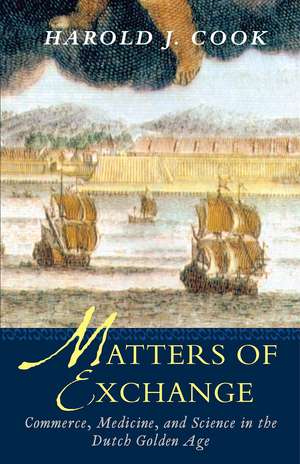Matters of Exchange: Commerce, Medicine, and Science in the Dutch Golden Age
Autor Harold J. Cooken Limba Engleză Paperback – 23 sep 2008
A new and unexpected history of the Dutch pursuit of commerce in the 16th and 17th centuries and how it triggered the Scientific Revolution
In this wide-ranging and stimulating book, a leading authority on the history of medicine and science presents convincing evidence that Dutch commerce—not religion—inspired the rise of science in the sixteenth and seventeenth centuries. Harold J. Cook scrutinizes a wealth of historical documents relating to the study of medicine and natural history in the Netherlands and elsewhere in Europe, Brazil, South Africa, and Asia during this era, and his conclusions are fresh and exciting. He uncovers direct links between the rise of trade and commerce in the Dutch Empire and the flourishing of scientific investigation. Cook argues that engaging in commerce changed the thinking of Dutch citizens, leading to a new emphasis on such values as objectivity, accumulation, and description. The preference for accurate information that accompanied the rise of commerce also laid the groundwork for the rise of science globally, wherever the Dutch engaged in trade. Medicine and natural history were fundamental aspects of this new science, as reflected in the development of gardens for both pleasure and botanical study, anatomical theaters, curiosity cabinets, and richly illustrated books about nature. Sweeping in scope and original in its insights, this book revises previous understandings of the history of science and ideas.
In this wide-ranging and stimulating book, a leading authority on the history of medicine and science presents convincing evidence that Dutch commerce—not religion—inspired the rise of science in the sixteenth and seventeenth centuries. Harold J. Cook scrutinizes a wealth of historical documents relating to the study of medicine and natural history in the Netherlands and elsewhere in Europe, Brazil, South Africa, and Asia during this era, and his conclusions are fresh and exciting. He uncovers direct links between the rise of trade and commerce in the Dutch Empire and the flourishing of scientific investigation. Cook argues that engaging in commerce changed the thinking of Dutch citizens, leading to a new emphasis on such values as objectivity, accumulation, and description. The preference for accurate information that accompanied the rise of commerce also laid the groundwork for the rise of science globally, wherever the Dutch engaged in trade. Medicine and natural history were fundamental aspects of this new science, as reflected in the development of gardens for both pleasure and botanical study, anatomical theaters, curiosity cabinets, and richly illustrated books about nature. Sweeping in scope and original in its insights, this book revises previous understandings of the history of science and ideas.
Preț: 540.70 lei
Nou
Puncte Express: 811
Preț estimativ în valută:
103.46€ • 108.02$ • 85.63£
103.46€ • 108.02$ • 85.63£
Carte tipărită la comandă
Livrare economică 04-18 aprilie
Preluare comenzi: 021 569.72.76
Specificații
ISBN-13: 9780300143218
ISBN-10: 0300143214
Pagini: 576
Ilustrații: 60 b-w illus.
Dimensiuni: 156 x 235 x 40 mm
Greutate: 0.79 kg
Editura: Yale University Press
Colecția Yale University Press
ISBN-10: 0300143214
Pagini: 576
Ilustrații: 60 b-w illus.
Dimensiuni: 156 x 235 x 40 mm
Greutate: 0.79 kg
Editura: Yale University Press
Colecția Yale University Press
Notă biografică
Harold J. Cook is director of the Wellcome Trust Centre for the History of Medicine and professor at University College London. He lives in London.
Descriere
A new and unexpected history of the Dutch pursuit of commerce in the 16th and 17th centuries and how it triggered the Scientific Revolution
